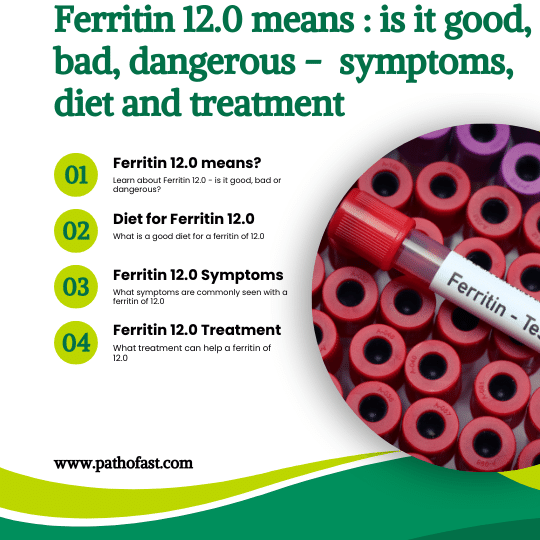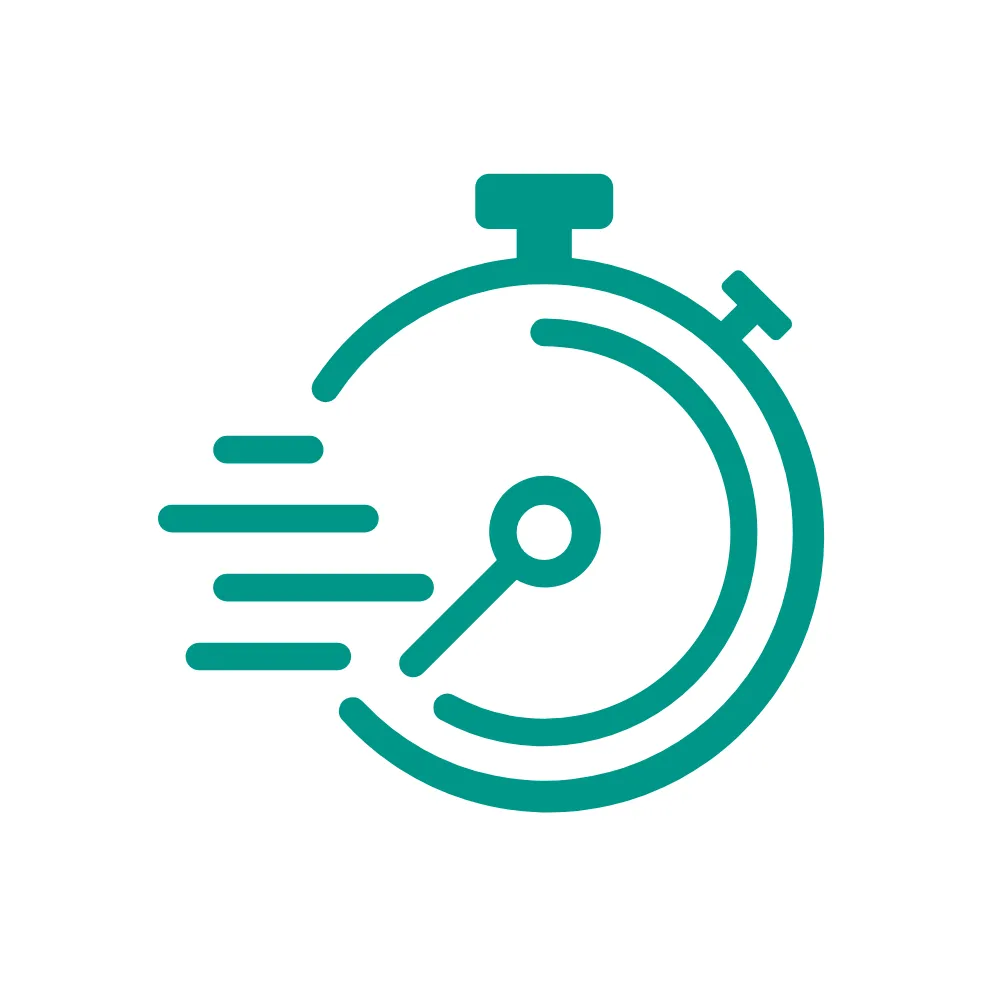
Ferritin 12.0 means : Is it normal, good, bad or dangerous
In this article we discuss what a Ferritin of 12.0 means, together with its causes, and whether it is good, bad or normal. We also look into the significance of Ferritin 12.0 in pregnancy.
Published Date : 2024-04-09T19:24:21.681Z
Updated Date : 2024-04-09T19:24:21.681+00:00
Table of Contents
What is Ferritin?
How is Ferritin measured?
What are the causes of ferritin of 12.0?
What is the normal range of Ferritin and how is a Ferritin of 12.0 graded?
What does a ferritin level of 12.0 mean?
What foods will help increase a ferritin of 12.0?
Suggest a weekly diet plan for increasing ferritin levels of 12.0
What are some symptoms of a ferritin of 12.0 ?
What is Ferritin?
Ferritin is a protein essential for iron storage. It is mainly produced in the liver and spleen. Iron from foods like red meat, legumes, and whole grains impacts ferritin levels. Its function is to securely store iron, releasing it when the body needs iron for processes like oxygen transport and supporting overall metabolic activities.
How is Ferritin measured?
A blood test is conducted to measure ferritin levels. Fasting beforehand is often advised for preparation. Labs use techniques such as chemiluminescent or immunoturbidimetric assays to analyze blood samples and assess ferritin concentration precisely.
What are the causes of ferritin of 12.0?
Ferritin of 12.0 have different causes, as listed below.
Chronic Kidney Disease
Impaired production of erythropoietin in chronic kidney disease can contribute to anemia and low serum ferritin levels.
Pregnancy
Increased iron demand during pregnancy may result in low serum ferritin levels if dietary intake is not adequately supplemented to meet the heightened requirements.
Inflammatory Conditions
Chronic inflammatory diseases like rheumatoid arthritis or systemic lupus erythematosus can interfere with iron metabolism, resulting in low serum ferritin levels.
Chronic Infections
Persistent infections, such as tuberculosis or HIV, can contribute to chronic inflammation, leading to low serum ferritin levels.
Vegetarian or Vegan Diets
Vegetarian or vegan diets may lack sufficient heme iron, contributing to lower iron absorption and resulting in low serum ferritin levels.
Hereditary Hemochromatosis
Hereditary hemochromatosis is a genetic disorder that causes excessive iron absorption, leading to iron overload and subsequent low serum ferritin levels.
Gastrointestinal Bleeding
Chronic bleeding in the gastrointestinal tract, often from conditions like peptic ulcers or colorectal cancer, can result in iron loss and low serum ferritin levels.
Thyroid Disorders
Conditions like hypothyroidism can affect iron metabolism, resulting in low serum ferritin levels and contributing to iron deficiency.
Hookworm Infection
Parasitic infections, including hookworms, can cause chronic blood loss and iron deficiency, leading to low serum ferritin levels.
Autoimmune Atrophic Gastritis
Autoimmune atrophic gastritis is a condition where the immune system damages the stomach lining, affecting iron absorption and contributing to low serum ferritin levels.
What is the normal range of Ferritin and how is a Ferritin of 12.0 graded?
Normal Ranges of Ferritin vary according to the age and gender. The ranges are considerably different in adults, children and pregnant women. Refer to the tables below for your exact range.
What are the normal ranges in children?
| Age Range | Reference Range (ug/L) | Is your child deficient? |
|---|---|---|
| 4 to 15 days | 99.6 - 717.0 | If your child is aged between 4 days - 15 days, a ferritin level of 12.0 is lower than normal. |
| 15 days to 6 months | 14.0 - 647.2 | If your child is aged between 15 days - 6 months, a ferritin level of 12.0 is lower than normal. |
| 6 months to 1 year | 8.4 - 181.9 | If your child is aged between 6 months - 1 year, a ferritin level of 12.0 is within normal limits |
| 1 to 5 years | 5.3 - 99.9 | If your child is aged between 1 year - 5 years, a ferritin level of 12.0 is within normal limits |
| 5 to 14 years | 13.7 - 78.8 | If your child is aged between 5 years - 14 years, a ferritin level of 12.0 is lower than normal. |
Reference : Ferritin normal ranges in children.
What are the normal ranges of ferritin in pregnancy?
| Range | Inference | Ferritin : 12.0 |
|---|---|---|
| <12 | Low Ferritin - Anemia | |
| 12 to 45 | Normal Ferritin | You are here |
| More than 45 | High Ferritin - Could lead to diabetes in pregnancy |
Reference : Ferritin and Anemia in PregnancyGestational Diabetes Mellitus and relation to Ferritin
What are the normal ranges in adult men?
| Range | Inference | Ferritin : 12.0 |
|---|---|---|
| <15 | Low Ferritin - Anemia | You are here |
| >15 - 35 | Below Normal but not anemia | |
| 35 - 220 | Normal | |
| >220 | Higher than normal |
Reference : Ferritin Reference Ranges in Adults
What are the normal ranges in adult women?
| Range | Inference | Ferritin : 12.0 |
|---|---|---|
| <15 | Low Ferritin - Anemia | You are here |
| 15 to 136 | Normal Ferritin | |
| More than 136 | High Ferritin |
Reference : Ferritin Reference Ranges in Adults
What does a ferritin level of 12.0 mean?
A level of ferritin 12.0 is considered to be below normal, and it means that your body has insufficient stores of iron. Ferritin is the storage form of iron in the human body and its value typically reflects how much iron we have. A value of 12.0 means that you dont have sufficient iron stores.
Is ferritin 12.0 good?
Ferritin 12.0 is borderline and may be accompanied by iron deficieny.
Is ferritin 12.0 bad?
Ferritin 12.0 is not bad, but needs further investigation
Is ferritin 12.0 dangerous?
Ferritin 12.0 is not dangerous, but needs further investigation
Is ferritin 12.0 low?
Ferritin 12.0 is borderline low, and may or may not be accompanied with iron deficiency symptoms.
What foods will help increase a ferritin of 12.0?
The following list of foods can help boost ferritin levels of 12.0. However, it is important to remember that
Breakfast cereals, fortified with 100% of the DV for iron
Consider getting upto 1 serving per day.
Oysters, eastern, cooked with moist heat
Consider getting upto 3 ounces per day.
White beans, canned
Consider getting upto 1 cup per day.
Beef liver, pan-fried
Consider getting upto 3 ounces per day.
Bread, whole wheat
Consider getting upto 1 slice per day.
Green peas, boiled
Consider getting upto ½ cup per day.
Cashew nuts, oil roasted
Consider getting upto 1 ounce (18 nuts) per day.
Mushrooms, white, sliced and stir-fried
Consider getting upto ½ cup per day.
Lentils, boiled and drained
Consider getting upto ½ cup per day.
Suggest a weekly diet plan for increasing ferritin levels of 12.0
Low levels of ferritin cannot be managed by diet alone. More often that not, iron supplments are required. Consult your doctor for appropriate medical advice. The following diet plans may help to supplement iron in your food.
Monday
Diet Plan to improve ferritin of 12.0
| Breakfast | Lunch | Dinner |
|---|---|---|
| Breakfast cereal fortified with 100% DV for iron | Tomato (canned, stewed, ½ cup) | Oysters, eastern, cooked with moist heat, 3 ounces |
Tuesday
Diet Plan to improve ferritin of 12.0
| Breakfast | Lunch | Dinner |
|---|---|---|
| Tofu (firm, ½ cup) | Kidney beans, canned, ½ cup | Potato, baked, flesh and skin, 1 medium potato |
Wednesday
Diet Plan to improve ferritin of 12.0
| Breakfast | Lunch | Dinner |
|---|---|---|
| Breakfast cereal fortified with 100% DV for iron | Lentils (boiled and drained, ½ cup) | Spinach (boiled and drained, ½ cup) |
Thursday
Diet Plan to improve ferritin of 12.0
| Breakfast | Lunch | Dinner |
|---|---|---|
| White beans, canned, 1 cup | Chocolate, dark, 45%–69% cacao solids, 1 ounce | Potato, baked, flesh and skin, 1 medium potato |
Friday
Diet Plan to improve ferritin of 12.0
| Breakfast | Lunch | Dinner |
|---|---|---|
| Lentils (boiled and drained, ½ cup) | Chocolate, dark, 45%–69% cacao solids, 1 ounce | Spinach (boiled and drained, ½ cup) |
Saturday
Diet Plan to improve ferritin of 12.0
| Breakfast | Lunch | Dinner |
|---|---|---|
| White beans, canned, 1 cup | Spinach (boiled and drained, ½ cup) | Sardines, Atlantic, canned in oil, drained solids with bone, 3 ounces |
Sunday
Diet Plan to improve ferritin of 12.0
| Breakfast | Lunch | Dinner |
|---|---|---|
| White beans, canned, 1 cup | Cashew nuts, oil roasted, 1 ounce (18 nuts) | Oysters, eastern, cooked with moist heat, 3 ounces |
What are some symptoms of a ferritin of 12.0 ?
A ferritin of 12.0 will usually show symptoms of iron deficiency. These will include various symptoms including those listed below.
Pica
Eating non-food items like ice, dirt, or clay
Pale skin
Skin may appear paler than usual
Difficulty swallowing
Feeling of obstruction or discomfort when swallowing
Irritability
Feeling easily annoyed or agitated
Fatigue
Feeling tired and lacking energy
Hair loss
Experiencing hair thinning or shedding
Difficulty concentrating
Finding it hard to focus or concentrate
Restless legs syndrome
Uncomfortable sensations in the legs, especially at night
Unusual cravings for non-nutritive substances
Desire to eat items with no nutritional value
Frequent infections
Increased susceptibility to infections

